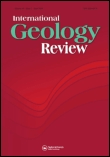
INTERNATIONAL GEOLOGY REVIEW
Scope & Guideline
Pioneering insights into the dynamic world of geology.
Introduction
Aims and Scopes
- Tectonic Evolution and Geodynamics:
Research articles often explore the tectonic history and geodynamics of various geological settings, including orogenic belts, fault systems, and the interaction of tectonic plates, providing insights into the processes driving continental formation and destruction. - Petrogenesis and Magmatism:
The journal frequently publishes studies on the petrogenesis of various rock types, particularly igneous and metamorphic rocks, examining their formation, mineral composition, and the geochemical processes involved. - Geochronology and Isotope Geochemistry:
A significant focus is placed on dating geological events and understanding the timing of tectonic, magmatic, and metamorphic processes through advanced geochronological techniques and isotopic analyses. - Mineral Resources and Economic Geology:
The journal covers topics related to mineral exploration, resource potential, and the economic implications of geological findings, particularly in relation to critical metals and sustainable resource management. - Paleoenvironments and Sedimentary Processes:
Research often discusses sedimentary processes and paleoenvironments, providing context for understanding the geological history and stratigraphic evolution of various regions. - Geological Hazards and Environmental Geology:
The journal includes studies on geological hazards, such as earthquakes and volcanic activity, as well as the environmental implications of geological processes, emphasizing sustainability and ecological engineering. - Geological Mapping and Spatial Analysis:
The use of geospatial analysis and geological mapping techniques to understand complex geological structures and their spatial relationships is a core methodological approach in many published studies.
Trending and Emerging
- Sustainable Resource Management and Circular Economy:
An increasing number of articles focus on sustainable practices in mineral extraction and the circular economy, emphasizing the importance of minimizing waste and maximizing resource recovery. - Advanced Geochemical Techniques and Data Integration:
There is a notable trend towards the use of advanced geochemical techniques, including isotopic studies and high-resolution geochronology, to provide detailed insights into geological processes. - Climate Change and Geological Impacts:
Research exploring the geological implications of climate change, including sedimentary responses and resource management, is on the rise, reflecting a growing concern for environmental sustainability. - Technological Innovations in Geology:
Emerging technologies such as remote sensing, GIS, and 3D geological modeling are increasingly featured, showing a trend towards integrating technology into geological research and exploration. - Interdisciplinary Studies:
There is a growing emphasis on interdisciplinary research that combines geology with other fields such as biology, ecology, and environmental science, facilitating a more holistic understanding of geological phenomena.
Declining or Waning
- Paleoclimatology and Paleoenvironments:
Research on ancient climates and paleoenvironments has become less prominent, possibly due to a shift towards more immediate geological applications and contemporary environmental issues. - Volcanology and Eruption Dynamics:
Although still present, detailed studies specifically focusing on eruption dynamics and volcanic processes appear to be waning, as the journal leans towards broader tectonic and geodynamic themes. - Geological Education and Public Engagement:
Papers addressing geological education and outreach efforts seem to be decreasing, which may reflect a trend towards more technical and specialized research topics. - Geological History of Lesser-known Regions:
There has been a noticeable reduction in studies focused on less-explored geological regions or historical geological events, possibly due to a greater emphasis on well-studied areas with significant data availability.
Similar Journals
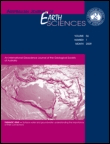
AUSTRALIAN JOURNAL OF EARTH SCIENCES
Connecting Scholars through Earth Science DiscoveryAustralian Journal of Earth Sciences, published by Taylor & Francis Ltd, has established itself as a leading journal in the field of Earth and Planetary Sciences since its inception in 1984. With an impactful reach reflected in its ranking as Q2 in the Earth and Planetary Sciences category, the journal contributes significantly to the advancement of knowledge through rigorous peer-reviewed research. While it is not Open Access, the journal ensures broad accessibility through institutional subscriptions and various academic platforms. With a commitment to covering diverse topics within the Earth sciences, including geosciences, geology, and environmental studies, the Australian Journal of Earth Sciences is an essential resource for researchers, professionals, and students seeking to deepen their understanding of the dynamic processes that shape our planet. Engaging with the journal means being part of a vibrant community that aspires to push the boundaries of scientific inquiry and innovation in Earth sciences.
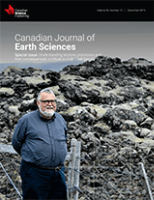
CANADIAN JOURNAL OF EARTH SCIENCES
Illuminating Geoscience Insights for a Sustainable FutureCanadian Journal of Earth Sciences, published by Canadian Science Publishing, serves as a leading platform for the dissemination of cutting-edge research in the field of Earth and Planetary Sciences. Since its inception in 1968, the journal has contributed significantly to the advancement of knowledge through its rigorous peer-reviewed articles and has established itself within the Q2 category in Earth and Planetary Sciences, reflecting its strong academic reputation and research impact. With an impactful ranking of #87 out of 195 in Scopus, it is positioned within the 55th percentile, showcasing its relevance and quality in the scientific community. The journal caters to a diverse readership ranging from seasoned researchers to emerging scholars, providing vital insights into geoscience disciplines and fostering discussions on significant environmental issues. While it is not an open-access publication, the Canadian Journal of Earth Sciences remains committed to accessible research, ensuring that high-quality findings are shared widely within the Canadian and global scientific communities.

Austrian Journal of Earth Sciences
Unveiling Earth's Secrets Through ResearchThe Austrian Journal of Earth Sciences, published by SCIENDO, is an esteemed open-access journal specializing in the disciplines of geology, paleontology, and stratigraphy. With an ISSN of 2072-7151, this journal has established itself as a significant platform for innovative research and scholarly communication in the earth sciences. Since its inception in 2007, it has continuously expanded its influence, achieving notable rankings in the Scopus database—#113 in Geology, #42 in Paleontology, and #21 in Stratigraphy, demonstrating its commitment to high-quality publications. The journal holds prestigious quartile rankings of Q1 in both Geology and Paleontology and Q2 in Stratigraphy as of 2023, reflecting its impact and relevance in the scientific community. Researchers and students alike are encouraged to explore and contribute to the evolving discourse within this dynamic field, as the Austrian Journal of Earth Sciences fosters collaboration and knowledge sharing across global platforms.
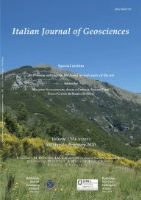
Italian Journal of Geosciences
Unlocking Planetary Insights: Where Earth Meets ResearchItalian Journal of Geosciences, published by the Società Geologica Italiana, is a distinguished platform for the dissemination of research in the fields of Earth and Planetary Sciences and Geology. With an impressive impact factor reflected in its 2023 rankings, where it placed in the Q3 category across its related fields, this journal serves as a vital resource for academics, practitioners, and students. Established in 2010 and poised to continue until 2024, the journal showcases critical advancements and interdisciplinary studies that deepen our understanding of geological processes and Earth systems. Operating under open access options, it offers robust accessibility to a broad audience, facilitating wider dissemination of knowledge. The journal's affiliation with Università degli Studi La Sapienza in Rome, Italy, further underscores its commitment to academic excellence and innovation in geosciences.

ANNALES SOCIETATIS GEOLOGORUM POLONIAE
Exploring the Frontiers of Geology and Stratigraphy.ANNALES SOCIETATIS GEOLOGORUM POLONIAE is a distinguished journal published by the Polish Geological Society, focusing on pivotal research in the fields of geology, economic geology, and stratigraphy. With an ISSN of 0208-9068, this journal has established itself as an essential platform for disseminating significant findings and advancements in geological sciences since its convergence in 2008. The journal proudly holds a Q2 quartile ranking in the categories of Economic Geology, Geology, and Stratigraphy as of 2023, indicating its respectable position within the global academic community. Researchers will find its indexed status in Scopus, ranking #138/321 in Geology and showcasing a solid presence in key geological sub-disciplines. While the journal is not open access, it remains a vital resource for professionals and students striving for insight into contemporary geological research. Located in Krakow, Poland, the journal continues to contribute significantly to the understanding of geological processes and resources, making it an indispensable reference for anyone in the field.
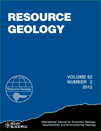
RESOURCE GEOLOGY
Connecting Geology with Resource InsightRESOURCE GEOLOGY, published by WILEY, is a peer-reviewed journal that serves as a vital platform for the dissemination of innovative research in the fields of geology and geochemistry. With an ISSN of 1344-1698 and e-ISSN 1751-3928, the journal has steadily contributed to the academic community since its inception in 1996, continuing through its planned convergence in 2024. With a Q3 ranking in both Geochemistry and Petrology and Geology categories, RESOURCE GEOLOGY is positioned within the competitive landscape of Earth and Planetary Sciences, ranked 164th and 93rd in its respective categories on Scopus, reflecting its significant contribution to the body of knowledge in these fields. While not an open-access journal, it provides access to essential research that advances our understanding of natural resources and geological processes. The journal is dedicated to publishing high-quality articles that appeal to researchers, professionals, and students looking to deepen their insight into the intricate interplay between geological phenomena and resource management.
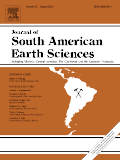
JOURNAL OF SOUTH AMERICAN EARTH SCIENCES
Unveiling Earth's Secrets Through South American LensesJOURNAL OF SOUTH AMERICAN EARTH SCIENCES is a premier interdisciplinary journal dedicated to publishing high-quality research in the fields of Earth-Surface Processes, Geology, and Paleontology, making it an essential resource for scientists and researchers focused on South American geology and its diverse geological phenomena. Published by Pergamon-Elsevier Science Ltd in the United Kingdom, this journal has been instrumental in disseminating groundbreaking studies since 1988, showcasing contributions that push the boundaries of knowledge in Earth and Planetary Sciences. With an impressive Scopus ranking—positioning it in the 74th percentile for Paleontology and 71st for Geology—this journal not only reflects robust academic quality but also its commitment to addressing critical geological challenges in South America. Researchers will appreciate its objective of advancing understanding of geological processes while providing insights into past, present, and future Earth environments. Although available through traditional subscription models, the journal's vast repository of articles enriches the academic landscape, facilitating the sharing of vital research among professionals, students, and geological practitioners.
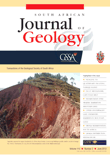
SOUTH AFRICAN JOURNAL OF GEOLOGY
Pioneering research for a sustainable geological future.The South African Journal of Geology (ISSN: 1012-0750, E-ISSN: 1996-8590) is a prestigious academic journal published by the Geological Society of South Africa, dedicated to advancing research and knowledge in the field of geology. Established in 1987, this journal has become a cornerstone for geoscientists, featuring a diverse range of studies that address key geological phenomena, particularly within the South African context. With its current quartile ranking of Q2 and an impressive Scopus rank placing it in the 70th percentile among Earth and Planetary Sciences, the journal is recognized for its significant contribution to the discipline. As researchers and professionals across the globe seek to explore and understand geological processes, the South African Journal of Geology stands out as an essential resource, fostering collaboration and innovation in geoscientific research.
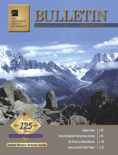
GEOLOGICAL SOCIETY OF AMERICA BULLETIN
Advancing Earth Sciences Through Rigorous ResearchThe Geological Society of America Bulletin (GSA Bulletin), with ISSN 0016-7606 and E-ISSN 1943-2674, is a premier scholarly journal published by Geological Society of America, Inc. Based in the United States, this journal has been a cornerstone of geological research since its inception in 1890, making significant contributions to the understanding of Earth sciences over more than a century. Recognized for its rigorous peer-review process, the GSA Bulletin currently holds a prestigious Q1 ranking in Geology, positioning it among the top 14 journals in Earth and Planetary Sciences in terms of Scopus ranking, reflecting the high quality and impact of the research it publishes. Researchers, professionals, and students alike benefit from its comprehensive coverage of geological topics, including sedimentology, volcanology, and paleontology, which supports the advancement of knowledge in the geosciences. While the journal is not open access, it continues to provide a vital platform for innovative research and critical discussions that shape the future of geology.

Moscow University Geology Bulletin
Unveiling Planetary Insights Through Innovative StudiesMoscow University Geology Bulletin, published by SPRINGER INT PUBL AG, is a prominent platform for disseminating critical research in the field of Earth and Planetary Sciences. With an ISSN of 0145-8752 and an E-ISSN of 1934-8436, this journal is well-regarded for its contributions to diverse geological studies and interdisciplinary advancements that shape our understanding of the planet. The journal has established itself in the academic community, particularly noted for its ranking in the Q3 category within Earth and Planetary Sciences as of 2023. Despite its limited open-access options, the Moscow University Geology Bulletin remains an essential resource for researchers, professionals, and students through its well-curated articles and synthesis of geoscientific knowledge. With annual volumes converging from various years, including significant years like 2012 to 2024, it aims to uphold its mission of fostering scholarly dialogue and innovation in the geosciences.